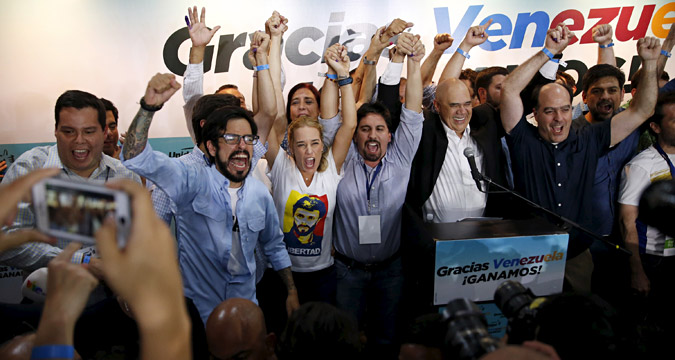
Lilian Tintori (C), wife of jailed Venezuelan opposition leader Leopoldo Lopez, celebrates with candidates of the Venezuelan coalition of opposition parties (MUD) during a news conference on the election in Caracas early Dec. 7, 2015.
ReutersAfter Argentina and Brazil, the crisis of left-wing populist ideas has hit Venezuela, reports the business daily Kommersant. According to the results of the parliamentary elections in the country, the opposition Democratic Unity Roundtable won control of the National Assembly.
The key reason for the failure of the ruling party's supporters is the economic crisis, which has resulted in serious shortages of essential goods.
Russian experts predict the beginning of the revision of a number of bilateral agreements between Moscow and Caracas. However, Kommersant's sources in the oil and gas industry confirm that no one is going to stop working in Venezuela, although there has been no official announcement on the matter.
The Venezuelan Embassy in the Russian Federation declined to comment to Kommersant on the possible consequences of the opposition's victory for Russian-Venezuelan relations, explaining that it was "not authorized to speak on this subject."
However, experts interviewed by Kommersant agree that the prospects for military cooperation are doubtful in the present circumstances.
The opposition has repeatedly said that the country does not need such a large arsenal, referring to high-speed aircraft and air defense batteries that have been bought in bulk by Caracas.
"These projects will be subject to the most revision by the new parliament," Vladimir Semago, former deputy chairman of the Russia-Venezuela Business Council (de-facto inactive for about seven years), told Kommersant.
However, Semago is also not too optimistic about the future of contracts in other areas. According to him, the Russian leadership’s key mistake was that it “chose the proven way of putting economic relations strictly on a government-to-government footing.” As a result, as Semago notes, the “productive dialogue” that had started to emerge “at the level of the private sector” remained in the past.
Russia is convening a closed meeting of the members of the UN Security Council after Turkey refused to withdraw its troops from Iraq, reports online newspaper Vzglyad, citing a source in the UN. The meeting is to be held on Dec. 8.
On Dec. 5, Iraqi Prime Minister Haider al-Abadi said that "around one armed battalion" of Turkish soldiers had entered the territory of his country on tanks.
Later, Nineveh Governor Nawfal al-Akub said that the Turkish unit, which entered under the pretext of training fighters of the Kurdish people's groups, amounted to about 900 people.
Abadi warned Turkey that it had only 24 hours left to withdraw its troops from Iraq before the matter was submitted to the UN Security Council.
Yevgeny Satanovsky, president of the Middle East Institute, a Moscow-based think tank, told Vzglyad what Russia intends to achieve by addressing the UN Security Council.
"By drawing attention to the illegal actions of Turkey, Russia is activating all the mechanisms that must work in accordance with international law," he told the newspaper.
In his view, it is impossible to accept that the Turks are doing.
"They are either getting ready to deprive Iraq of Mosul – a long-cherished dream of the Turkish leadership, or going to open a new channel for pumping oil through Iraqi Kurdistan to their refineries from the Islamic State," said Satanovsky, echoing Russian President Vladimir Putin’s recent assertion that Turkey is purchasing oil from ISIS.
State Duma members and experts have expressed concern about a surge of extremism in prisons, the centrist daily Nezavisimaya Gazeta reports.
The criminal environment can be a favorable place for recruiting newcomers to the ranks of, for example, radical Islamists, representatives of the Public Chamber believe.
"Places of detention are the most fertile soil, where people tend to receive such information," said Mikhail Starshinov, first deputy head of the Duma Committee on Nationalities.
"We need to provide an additional prison sentence for advocating radicalism in places of detention," Dmitry Galochkin, member of the Public Chamber and the Public Council under the Federal Penitentiary Service, told Nezavisimaya Gazeta.
Those convicted of extremist crimes, he says, should be isolated from other prisoners – separate prisons or special sections should be created for them. The expert stresses that the main task is to "recruit these people back."
Representatives of the Federal Penitentiary Service noted that the situation is under control – the relevant inmates are put on the preventive register, the most experienced educational service staff are assigned to them, and separate work is being carried out with them – including with the involvement of priests.
All rights reserved by Rossiyskaya Gazeta.
Subscribe
to our newsletter!
Get the week's best stories straight to your inbox